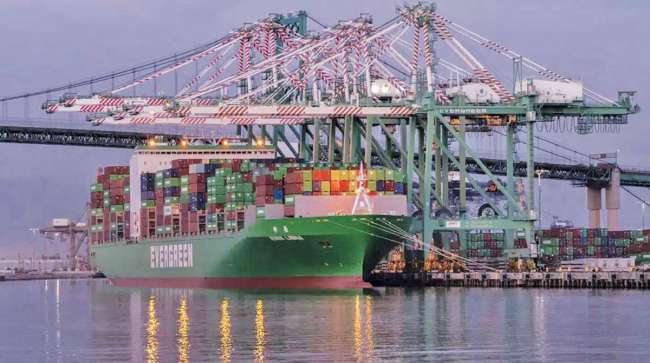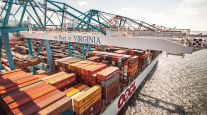Staff Reporter
Port of L.A.’s Seroka: No Contingency Plans for Strike

[Stay on top of transportation news: Get TTNews in your inbox.]
Port of Los Angeles Executive Director Gene Seroka said April 12 that there are no contingency plans if labor negotiations turn into a work stoppage or strike.
The Pacific Maritime Association has been in contract talks with the International Longshore and Warehouse Union since the middle of last year. PMA represents ocean carriers and terminal operators.
“There are no contingency plans for this,” Seroka said when asked during an online press conference. “This is not a transactional business. Purchase orders go in from merchandisers at large and small companies 90 to 120 days before a ship sails. Once that product is ready and it’s booked to a vessel, that’s en route from 14 up to 40 days before it gets to Los Angeles, and then moves to its onward carriage, destination, warehouse, fulfillment center, crossdock or storefront for our ultimate consumers.”
Seroka doesn’t believe a full-on work stoppage is likely; the union hasn’t gone on strike since the early 1970s. He noted that there is no strike vote planned at this time. Seroka also praised the rank-and-file dockworkers for being on the job six days a week since the pandemic began.
Watch PMA President and CEO Jim McKenna deliver remarks ahead of negotiations with the ILWU for a new Pacific Coast contract. Highlights include PMA’s guiding principles for talks and a commitment to reaching an agreement without disruption. https://t.co/QgurZQ8m0f — Pacific Maritime Association (@WestCoastPorts) May 9, 2022
“We need to continue to focus our efforts at the table,” Seroka said. “I don’t see a widespread labor disruption at any time in the future, but again, all eyes are focused on us. We’ve been 11 months in negotiations as an industry, the PMA and the ILWU. It’s time to cut through all these very challenging discussions and get to an agreement, bring that confidence back to the marketplace.”
Negotiations hit a speed bump the prior week when a labor shortage halted operations for two days starting April 6. PMA accused ILWU Local 13 of withholding labor during the morning shift and said those actions effectively shut down the ports of Los Angeles and Long Beach. The National Retail Federation responded by renewing calls to the White House to engage in the negotiations and prevent disruptions to cargo flows.

Seroka
“The ports of L.A. and Long Beach saw a little movement of goods on last Thursday’s nightside and Friday’s dayside shifts,” Seroka said. “On Thursday, the ILWU’s routine first-of the-month stop work meeting was held, during which the new president of Local 13, Gary Herrera, was installed, taking over for Ramon Ponce de Leon. The collective bargaining agreement between the union and the employers guarantees these monthly meetings, which are dedicated to addressing the union’s proceedings.”
Seroka added the first shift that Friday also concluded with little work at cargo terminals. Operations returned to normal on Friday evening. He noted that there normally is a lower volume of activity during the morning shift on Good Friday, so the impact to operations was relatively minor.
“However, this situation captured the nation’s attention, and rightly so,” Seroka said. “It’s a reminder that a negotiated labor agreement is crucial in our efforts to regain shipper confidence and bring the cargo back to L.A. Although we don’t have a seat at the bargaining table, we’re closely monitoring the situation on a daily basis, we’re maintaining communication with acting Labor Secretary Julie Su, officials at the federal, state and local levels, along with representatives from both sides of the negotiations. Simply put, there’s no bigger priority right now than this contract agreement.”
The Port of Los Angeles processed 623,234 Twenty-Foot Equivalent Units (TEUs) in March 2023, closing out a soft first quarter. For the first three months of 2023, the Port handled 1,837,094 TEUs, down 32% compared to 2022, the best Q1 in #PortofLA history. https://t.co/Ex4PNTPY5I pic.twitter.com/3UighsRapY — Port of Los Angeles (@PortofLA) April 12, 2023
Seroka said widespread concern over the negotiations and overall marketplace trends hitting discretionary spending were to blame for a recent decline in port volumes. Los Angeles saw a 35% year-over-year decline in processed volumes to 623,000 20-foot equivalent units in March. The year-ago period was exceptionally busy, but the recent data still was down 13% compared with the five-year average. However, it was up 28% from the prior month.
Want more news? Listen to today's daily briefing below or go here for more info:




